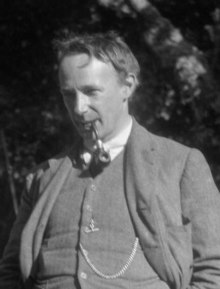
Back George Edward Moore Afrikaans جورج إدوارد مور Arabic جورج ادوارد مور ARZ Джордж Едуард Мур Bulgarian George Edward Moore Catalan George Edward Moore Czech G. E. Moore Welsh George Edward Moore German G.E. Moore Esperanto George Edward Moore Spanish
G. E. Moore | |
|---|---|
 Moore in 1914 | |
| Born | George Edward Moore 4 November 1873 Hastings Lodge, Victoria Road, Dulwich Wood Park, Upper Norwood, London, England |
| Died | 24 October 1958 (aged 84) Evelyn Nursing Home, Cambridge, England |
| Other names |
|
| Education | Trinity College, Cambridge (B.A., 1896) |
| Spouse | Dorothy Ely |
| Children | Nicholas Moore, Timothy Moore |
| Relatives | Thomas Sturge Moore (brother) |
| Era | |
| Region | Western philosophy |
| School | Analytic philosophy Consequentialism |
| Institutions | Trinity College, Cambridge Aristotelian Society (president, 1918–19) Ethical Union (president, 1935–36) |
| Academic advisors | James Ward[1] |
| Doctoral students | Casimir Lewy |
| Other notable students | R. B. Braithwaite[5] |
Main interests | Philosophy of language |
Notable ideas |
|
George Edward Moore OM FBA (4 November 1873 – 24 October 1958) was an English philosopher, who with Bertrand Russell, Ludwig Wittgenstein and earlier Gottlob Frege was among the initiators of analytic philosophy. He and Russell began deemphasizing the idealism which was then prevalent among British philosophers and became known for advocating common-sense concepts and contributing to ethics, epistemology and metaphysics. He was said to have an "exceptional personality and moral character".[6] Ray Monk later dubbed him "the most revered philosopher of his era".[7]
As Professor of Philosophy at the University of Cambridge, he influenced but abstained from the Bloomsbury Group, an informal set of intellectuals. He edited the journal Mind. He was a member of the Cambridge Apostles from 1894 to 1901,[8] a fellow of the British Academy from 1918, and was chairman of the Cambridge University Moral Sciences Club in 1912–1944.[9][10] As a humanist, he presided over the British Ethical Union (now Humanists UK) in 1935–1936.[11]
- ^ Zalta, Edward N. (ed.). "James Ward". Stanford Encyclopedia of Philosophy. by Pierfrancesco Basile.
- ^ G. E. Moore (15 December 1919), "External and Internal Relations", Proceedings of the Aristotelian Society 20 (1919–20): 40–62.
- ^ G. E. Moore, "The Refutation of Idealism" (1903), p. 37.
- ^ Robert Hanna, Kant, Science, and Human Nature. Clarendon Press, 2006, p. 60.
- ^ Alice Ambrose, Morris Lazerowitz (eds.), G. E. Moore: Essays in Retrospect, Volume 3, Psychology Press, 2004, p. 25.
- ^ Preston, Aaron [in Swedish]. "George Edward Moore (1873—1958)". Internet Encyclopedia of Philosophy. Retrieved 19 August 2020.
- ^ Monk, Ray (3 April 2020). "He was the most revered philosopher of his era. So why did GE Moore disappear from history?". Prospect. London. Retrieved 21 June 2021.
- ^ Levy, Paul (1979). Moore: G.E. Moore and the Cambridge Apostles. London: Weidenfeld and Nicolson. p. 319. ISBN 0297775766.
- ^ Stern, David G.; Rogers, Brian; Citron, Gabriel, eds. (2016). Wittgenstein: Lectures, Cambridge 1930–1933: From the Notes of G. E. Moore. Cambridge University Press. ISBN 9781316432136. Retrieved 29 April 2020.
- ^ Ahmed, Arif (6 September 2013). "The Moral Sciences Club (A Short History)". Faculty of Philosophy. University of Cambridge. Retrieved 29 April 2020.
- ^ "Annual Reports of the Ethical Union" (1946-1967). British Humanist Association, Series: Congress Minutes and Papers, 1913-1991, File: Minute Book. London: Bishopsgate Institute Special Collections and Archives.
© MMXXIII Rich X Search. We shall prevail. All rights reserved. Rich X Search